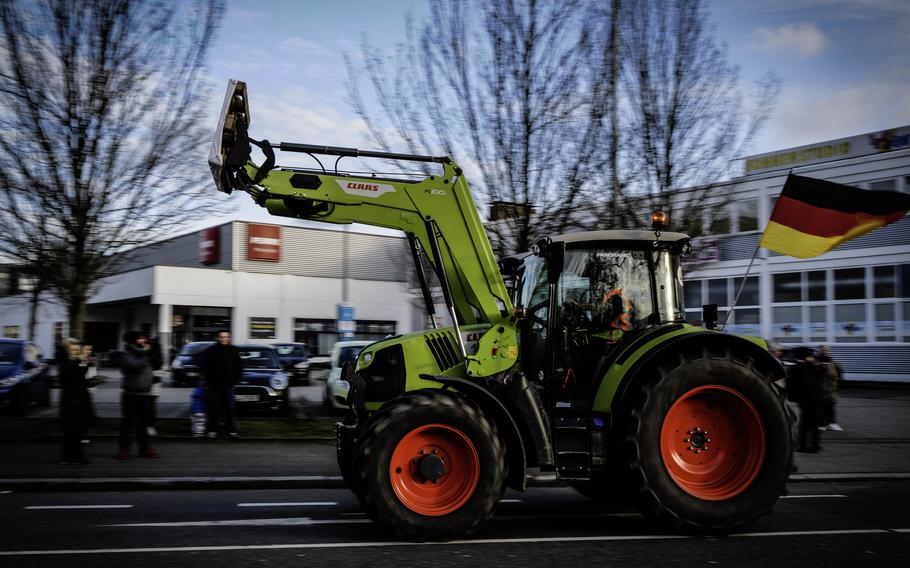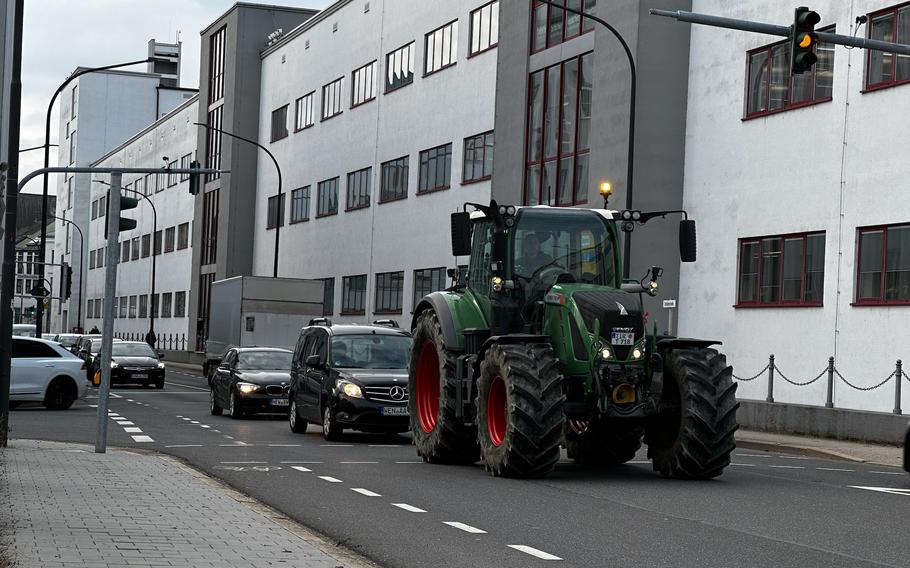
Farmers aboard their tractors roll down a main road in Kaiserslautern, Germany, on Jan. 8, 2024, highlighting their opposition against agricultural policy changes announced by the German government. (Alexander Riedel/Stars and Stripes)
KAISERSLAUTERN, Germany — Farmers in Germany kicked off a week of protests Monday with widespread highway shutdowns and city center demonstrations, including near U.S. military communities, in opposition to the federal government’s proposed cuts to agricultural subsidies.
The weeklong demonstrations are set to last until Jan. 15, the German Farmers’ Union announced, and are expected to cause significant traffic disruptions in numerous German cities, including those in the Kaiserslautern Military Community and around U.S. posts in Bavaria.
Early Monday morning, a convoy of 566 tractors, trucks and other vehicles, accompanied by 550 people on foot, assembled along Berlin’s 17th of June Street, effectively paralyzing the boulevard between the Brandenburg Gate and the city’s famous Victory Column, German news service Deutsche Welle reported.
In the Kaiserslautern area, home to tens of thousands of U.S. service members, around 1,000 participants with more than 600 vehicles blocked traffic at 35 locations. The protests included access ramps to at least five major highways and several district roads during the morning commute, Kaiserslautern police said.
For more than three hours on Monday afternoon in Kaiserslautern’s city center, 530 tractors and semi-trucks rolled through, honking their horns and waving at bystanders.
Their discontent primarily comes from the government’s plan to eliminate a tax break on agricultural diesel. Farmers argue that it will raise their costs and could drive them out of business.
Lukas Gebhardt, a farmer from nearby Hoeringen, joined the protests with his John Deere tractor to express concerns over the impact of increasing expenses on small family farms.
“With the fuel taxes, more costly vehicle registration and ongoing regulatory changes affecting agricultural businesses, everything is getting more expensive,” Gebhardt told Stars and Stripes. “We’re here to tell the politicians that there is a limit.”
The protests, which have also drawn support from various professions, including animal transport companies and truckers, reflect a broader discontent with economic policies.
The German governing coalition revised its stance last week, offering to keep some of the subsidies; however, farmers are calling for the plan to be abandoned entirely.
Rainer Mueller, a driver for Kaiserslautern-based construction company F.K. Horn, said he and his co-workers joined the protest to show solidarity with farmers and highlight the cascading effect of tax hike policies on middle-class businesses.
“These changes affect every company involved in transportation,” Mueller said. “It is about the trucking tolls, the diesel taxes. All this raises the costs for everything. In the end, that means businesses can’t afford to hire people or cannot start construction projects. It affects us all.”
The 569th U.S. Police Squadron warned of traffic disruptions, and Ramstein Air Base advised commuters to plan for delays. U.S. Army Garrison Bavaria also issued warnings, noting that while the protests are not directed at American service members, disruptions to commutes are expected.
In the Oberpfalz region of Bavaria, home to U.S. training areas in Hohenfels and Grafenwoehr, there were more than 30 blockades and protest sites, where up to 6,100 people participated with around 6,000 vehicles, Oberpfalz police said Monday.
Protests in Amberg and Weiden included motorcades and gatherings at key locations, adding to the widespread impact.
Most of the protest sites were preapproved by communities as legal protest activities under German law. Police said most demonstrations were conducted safely, with some exceptions.
A 30-year-old Bavarian farmer is facing charges of dangerous interference with road traffic and coercion after causing a backlog of several miles, following an unapproved protest on the A93 highway, according to police.
Further protests have been announced throughout Germany for the week, culminating in a national farmers rally in Berlin on Jan. 15.

A farmer blocks traffic by slowly driving through downtown Weiden, Germany, Jan. 8, 2024. Farmers throughout Germany are protesting agricultural legislation that included the proposed removal of diesel fuel subsidies for farm vehicles. (Michael Slavin/Stars and Stripes)